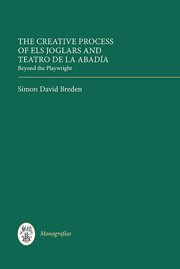Conclusion
Published online by Cambridge University Press: 05 April 2014
Summary
This study began with the claim that the creative process determines the qualities of performance by looking at the examples of Els Joglars and the Teatro de la Abadía, two Spanish companies that have developed a particular methodology in rehearsal and raised the bar in terms of current performance in Spain. The two parts of the study dealt with the creative process of both companies by constructing a record of rehearsal for two case study productions and contrasting them with past productions, as well as offering international contextualisation. The result has been to clarify the rehearsal process of the companies and situate them within an international theatre climate, at the forefront of a methodology based on a collective and physical approach. Furthermore, I have argued that their systems of rehearsal serve to create cohesive collective working units which in turn generate heightened engagement with their audiences by redefining the audience's experience of viewing theatre. It remains to evaluate the success of these models as well as identifying the current state of both companies. This conclusion will establish process as the main artistic thrust that has contributed to the development of the two companies. My aim has been not only to research the work of Els Joglars and the Teatro de la Abadía, but also to demonstrate how a carefully devised rehearsal may evolve into a coherent and organic artistic entity in its own right.
If we use Forced Entertainment as an example of a company that define themselves according to the process they have devised, we can see how they conceive their process as inseparable from the oft-studied text or performance: ‘We don't hate theatre […] We're gripped by it – and its liveness.
- Type
- Chapter
- Information
- The Creative Process of Els Joglars and Teatro de la AbadíaBeyond the Playwright, pp. 223 - 236Publisher: Boydell & BrewerPrint publication year: 2014

